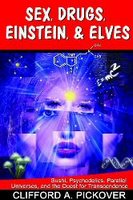Saturday, April 29, 2006
Bible says that there is no afterlife
Tuesday, April 25, 2006
Can an Atheist Believe in the Afterlife?

In this interesting article, an atheist suggest that the "Self" is part of all mobile organisms: it is rudimentary in most, consisting of the ability of the organism to orient itself in its environment and usually to distinguish itself from what is not itself and friend from foe. More complex organisms evolved a full array of senses and balance. The conscious awareness evolved from the rudimentary to the complex because it enhanced our prospects for survival. The most complex organisms have the ability to foresee their own death and to ponder what happened to a loved one who has died. Neanderthal burial sites, complete with flowers, have been discovered; Contrast this with the fact that by the time a goldfish swims from one end of the tank to the other, it has forgotten that there is a glass wall there! A goldfish's awareness, though sufficient to keep it alive, is nonetheless quite dim compared to ours. But in all cases, the awareness is a process that is established by the nervous system and vanishes into non-existence upon the destruction of that nervous system. Read more.
Tuesday, April 11, 2006
Religion in the year 2200
Saturday, April 01, 2006
Did Jesus want his message to spread in a clear manner?

If Jesus had wanted his message to spread in an undistorted fashion, why did he not write down his message?
In other words, if one reason he had come was to reveal the will of God, why did Jesus seemingly fail to commit his revelations to writing during his lifetime, and with his own hand. Instead, it appears that he left this important task to "anonymous writers" (and later redactors) who may have made a sufficient number of mistakes and written a sufficient number of contradictory facts and ideas in their accounts to divide Christians for centuries to come.
Couldn't Jesus have written down his message in a clear manner? If he did, why don't the gospels tell us of his writings?
 Godlorica
Godlorica

























